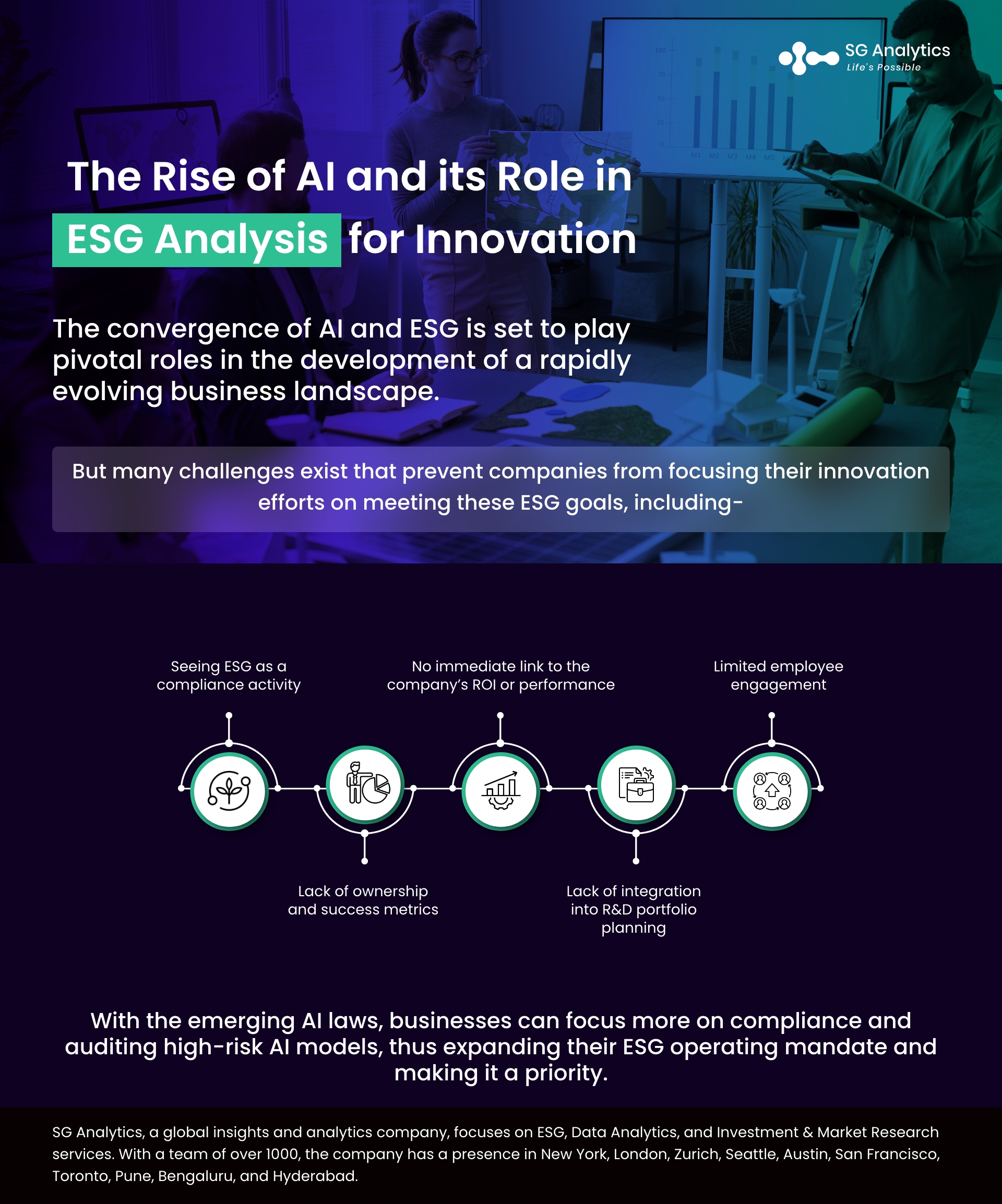The complexity of growing technological innovations and difficulties in containing them are being reflected in the efforts of regulators. While the industry-wide attempts to self-regulate are gaining little traction, businesses are mobilizing their efforts to integrate sustainability frameworks.
But the burden is not just regulatory. Businesses also need to engage with the growing environmental, social, and governance (ESG) concerns like climate change or employee welfare.
Given the potential concerns surrounding artificial intelligence, it is time for investors to use this powerful tool.
AI holds the potential to enhance ESG initiatives. However, it is important to recognize the opportunities as well as the challenges that come with implementing this technology. Data privacy, AI ethics, and implementation strategies are critical for companies to understand when designing AI applications in the context of ESG.
It’s worth noting that ESG accounts for environmental protection and reducing the negative impacts on the environment (E) while delivering a positive social impact for social groups (S) and governing with transparency (G). Several frameworks have emerged for organizations to estimate the performance and impact of ESG-related programs, including-
-
Global Reporting Initiative (GRI)
-
Sustainability Accounting Standards Board (SASB)
-
United National Global Compact (UNGC)
-
Taskforce on Climate-related Financial Disclosures (TCFD)
Read more: A Guide to Improving Environmental Sustainability in IT Infrastructure
While these frameworks help drive commonality in the way corporations communicate their ESG activities, none of them directly help in measuring how innovation efforts are driving ESG impact. This equips businesses with an opportunity to rethink ESG as a framework for shaping and offering purposeful innovation in how companies operate and design new products and services.
There is a growing need for greater safety measures that will help in making the technology more sophisticated.

The Ethical ESG Concerns of Generative AI
Reactions to AI often fall into two spectrums - embracing the power of AI without limitations or shutting it down entirely. Companies are looking to strike a balance in the middle of these two responses by embracing the opportunity while understanding the risks around environmental, social, and governance concerns.
Advances in AI help encompass a variety of emerging technologies, making it easier for businesses to automate complex tasks at incredible speeds, thereby revolutionizing the way organizations work with data. Today, AI has become commonplace and essential to the operations of mainstream organizations. Failing to harness and leverage AI will put them behind the competition.
These AI capabilities are proving equally useful for ESG investing if businesses choose to reflect on the growing sensitivity of consumers and how companies operate as factors in their buying decisions. The growing interest of investors will further help mitigate risk and ensure their long-term sustainability.
Read more: ESG Outlook: How Tech Companies Harness Data to Reimagine Their Business
-
Social Implications
Many enterprises are turning to AI-based tools to make hiring processes simpler, and some are exploring the technology’s ability to make firing decisions. The growing use of generative AI tools to power the recruiting processes is becoming the norm. It is changing how humans are employed.
Corporations are integrating AI algorithms across different parts of the hiring process, but many algorithms lack transparency as there is no easy way to determine any social, gender, or economic bias. AI systems can easily inherit biases from historical data that can often perpetuate existing inequalities and discrimination in hiring practices. While modern ESG strategies focus on improving outcomes, leaning too heavily on AI for HR decision-making purposes can interfere with ESG objectives.
On the contrary, properly trained AI models can have positive effects on existing discriminatory practices and systems, as they can assist in reducing bias in hiring by focusing on skills, identifying talent from a wider range, and using detailed analytics to enhance workplace design, thus fostering a more inclusive environment.
-
Governance Challenges
Governments are paying close attention to AI technology, resulting in a new wave of regulations that will help create new compliance risks for companies. The data collected for AI applications can be misused or mishandled, leading to privacy violations and legal repercussions. Additionally, data breaches can also lead to unauthorized access and disclosure of sensitive information.
However, with the emergence of a range of responsive AI tools, organizations are exploring ways to limit the use of these tools at work by putting limits on the quantum of data that can be uploaded. Organizations are concerned about employees entering confidential data into the tools. A number of corporations have even embarked on building their own generative AI tools for security concerns.
-
Environmental Challenges
AI is playing a significant role in computing power. Today, many data centers are powered by fossil fuels and require vast amounts of water for cooling. This environmental impact of generative AI is a growing concern as the total data center energy consumption is set to grow in the coming years.

Read more: Sustainable Framework: How can Organizations Make Generative AI Green?
Fostering ESG-driven Innovation
At the crossroads of technology, sustainability, and artificial intelligence lies the ability to make a dramatic impact on ESG - accounting for environmental, social, and governance risks and opportunities. While AI holds the potential to unearth key data for investors, discerning unreliable information can be viewed as a key challenge.
Investment managers are feeling increasing pressure to measure ESG criteria in their portfolios. However, the lack of data makes it challenging to assess the long-term risks and rewards. This is where AI provides the solution. Technologies help in filtering essential data, thus acting as the catalyst to support sustainable investing at scale.
However, significant challenges still prevail in understanding and measuring the critical impact of ESG. There is also a lack of standards that organizations can follow to embed ESG priorities into their R&D and innovation efforts. Investors are still skeptical about ESG objectives and requirements, believing that ESG requirements are strict and can often be perceived as a roadblock in generating maximum returns. Due to this, many challenges exist that further prevent companies from focusing their innovation efforts on meeting these ESG goals, including:
-
seeing ESG as a compliance activity
-
lack of ownership and success metrics
-
no immediate link to the company's ROI or performance
-
lack of integration into R&D portfolio planning
-
limited employee engagement
However, the significance of ESG in today’s world and its synergy with AI technologies is acting as a catalyst in achieving ESG objectives, from environmental sustainability to social responsibility and governance. This critical evaluation of AI’s impact on ESG metrics, as well as actionable insights for mitigating potential challenges, is equipping organizations to not only achieve their sustainability goals but also unlock new avenues for driving both sustainable development and innovation.
The convergence of artificial intelligence (AI) and environmental, social, and governance (ESG) factors are set to play pivotal roles in the development of today’s rapidly evolving business landscape. The symbiotic relationship between AI and ESG is enabling businesses to outline how AI technologies can be applied to enhance ESG management as well as mitigate related risks.
Read more: AI at Crossroads: Navigating AI Safety in the Evolving Startup Landscape

Conclusion
AI ethical frameworks are binding organizations worldwide so that they can enjoy a stronger regulatory environment on high-risk AI applications. By striking the right balance, businesses can integrate ESG policy standings on AI in their ESG roles.
Today, AI is viewed as an incredibly powerful tool, but stakeholder risk management must also emerge as a business imperative to ensure corporate purpose is always at the front. AI models consume massive amounts of power to compute and are expensive chips for manufacturing, making an imbalance possible. Therefore, more governance is needed. Hence, ESG professionals will have to become more technically skilled in the field of AI to introduce the right set of policies and regulatory compliance.
With the emerging AI laws, businesses will focus more on compliance and auditing high-risk AI models, thus expanding their ESG operating mandate and making it a priority.
SG Analytics, recognized by the Financial Times as one of APAC's fastest-growing firms, is a prominent insights and analytics company specializing in data-centric research and contextual analytics. Operating globally across the US, UK, Poland, Switzerland, and India, we expertly guide data from inception to transform it into invaluable insights using our knowledge-driven ecosystem, results-focused solutions, and advanced technology platform. Our distinguished clientele, including Fortune 500 giants, attests to our mastery of harnessing data with purpose, merging content and context to overcome business challenges. With our Brand Promise of "Life's Possible," we consistently deliver enduring value, ensuring the utmost client delight.
A leader in ESG Services, SG Analytics offers bespoke sustainability consulting services and research support for informed decision-making. Contact us today if you are searching for an efficient ESG (Environmental, Social, and Governance) integration and management solution provider to boost your sustainable performance.
About SG Analytics
SG Analytics is an industry-leading global insights and analytics firm providing data-centric research and contextual analytics services to its clients, including Fortune 500 companies, across BFSI, Technology, Media & Entertainment, and Healthcare sectors. Established in 2007, SG Analytics is a Great Place to Work® (GPTW) certified company and has a team of over 1100 employees and has presence across the U.S.A, the U.K., Switzerland, Canada, and India.
Apart from being recognized by reputed firms such as Analytics India Magazine, Everest Group, and ISG, SG Analytics has been recently awarded as the top ESG consultancy of the year 2022 and Idea Awards 2023 by Entrepreneur India in the “Best Use of Data” category.









